Slim verse (x 3)
Warp and Weft
by Carla Stein
Chilliwack: Tigerpetal Press, 2024
$15.00 / 9780995863972
Future Tense
by Lauren Peat
London: Baseline Press, 2024
$15.00 / 9781998521005
a tangle of words
by Yvonne Adalian, Mavis Beggs, Elektra Harris, Natalie Hryciuk, barb snyder, and B. Violet
[self-published, 2024*]
Reviewed by Heidi Greco
*
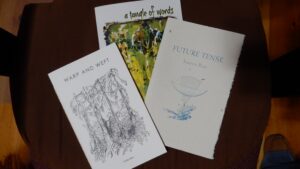
Every poet’s first love, their dream of publication, often lies with thoughts of a chapbook. We admire the way each small book is unique, often elegant of design—and, of course, for the words it contains.
Three chapbooks have recently come into my life, and each has a personality all its own.
The first, Nanaimo poet and artist Carla Stein’s Warp and Weft, is a small treasure, bound with what appears to be a line of hand-stitching—one of the hallmarks of the nicest chapbooks.
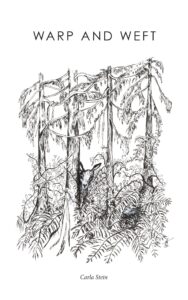
The poems are meditative and reflect Stein’s appreciation of nature and her deep connections to the landscape where she resides.
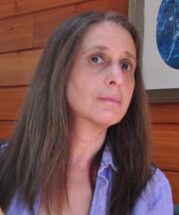
In addition to writing poems, she’s an artist. The cover appears to be an ink drawing of deer looking out from a cedar-and-fern setting—so Vancouver Island!
In addition, several of her colour illustrations are interspersed throughout the pages, amplifying the respect she feels for the world around her.
Yet her words create such clear visual images, the poems don’t actually need illustrations, as in these closing lines about a pond containing bull rushes:
brown sentinel spikes
admonish intruders
to pause at the edge
But this is not to mistake Stein for any one-note writer. A poem dedicated “To Emily Dickinson in 2021” offers this advice to that lonely poet:
Forget the stars –
gaze at twinkling signs on the wildest nights and
Scatter the feathers of hope
*

Although produced back east in London by the always-of-interest Baseline Press, poet Lauren Peat is BC-based, currently residing in Vancouver. Future Tense, her entry in this triad, makes me think I should don gloves before touching it. Bound with a single strand of what appears to be linen thread, traditional simplicity rules this chapbook’s design. The cover stock appears to be handmade paper, with a rough surface that’s laden with textured bits. End pages are Uzumaki tissue—decorative, almost lacy—interlaid papers. They pick up the blue in the cover illustration, a detail from the sketch of a patent for a flying machine from 1889.

Whimsical and dreamlike, that image sets the stage for the poems that begins one morning at Vancouver’s Olympic Station on the Canada Line. There, we find a “man curled into a comma by the TD Bank,” a true image of the city if ever there was one.
If there is a unifying metaphor that extends throughout these pages, it must be the thread of sound. Whether it’s “the magpie cussing in the fir tree” or “the lucid dream of an orchestra tuning,” sounds are noted on nearly every page. Even a freight train “sustains a D major chord.”
There’s also the poignancy of the poem for “the orca that mourned her calf/for 1,000 miles.” It informs us that she “is pregnant again” yet tells us how
I too watched her nudge the body
forward & thought:
longing’s a handicap
a cold fin in your mouth
a whistled warning
against the laws of gravity
Her prose poem “first snow” is almost circular in the ways it uses repetition: “if snow, if anything, had a clear motive. if a clear motive were something you could see through, could fog up with breath, like glass.” The chill air of first snow lingers.
*
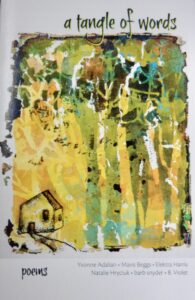
The third volume is a self-published selection of poems by a group of six women who live in the Lower Mainland. They signed up for “a course at Simon Fraser University: Poetry Series for the Weekend Student, taught by Evelyn Lau and [then] Vancouver Poet Laureate Fiona Tinwei Lam.” It seems the two instructors made the suggestion that forming a writers’ group could provide ongoing support for students to continue. So that’s exactly what they did, and now some of their work has seen print with this small booklet.
Arranged in short thematically determined parts (Passions, Rituals, Tensions, Elegies), not every one of the six has work in every section. This shows a restraint not often found in writers who decide to self-publish. For the strength of their collective editing, this group must be commended.
Social commentary plays a role in several poems. Mavis Beggs takes a swipe at the artifice of conversation that often occurs at parties where she expresses her
wish to discuss literature
whether Mrs. Dalloway is a likeable character
whether any of us are, whether it even matters
instead bob along interminable banter
about films I’ve never seen, people I’ve never met
Beggs also has a powerful poem about the wildfires of summer, where “in the sky a red coin burns.”
The section titled Elegies contains some of the strongest poems in the collection. B. Violet’s “August Before and After” moves from the glorious—“August arrives in a crush/of blackberry/indigo smeared and sweet”—to a time of loss when “the days become drunk/cold and hollow-handed.” In the same section Natalie Hryciuk’s poem portrays her parents—in these lines, specifically her father:
my father and his scythe
move as one
long sweeping motions
through a sea
of green silk
a chorus of sighs
as swathes of grass
sink to the ground
It is here that we also find the poem by Elektra Harris that relates how she and her sister take their mother’s ashes “to the bird park/by the duck pond,/surrounded by trees,” a fitting place for a woman who loved birds, who the siblings remember with “a chickadee eating seeds from [her] hand.”
Yvonne Adalian offers respite with several light poems, including one about Shakespeare where she confesses:
I can’t stop loving you, William
though you’re a married man.
I see you sitting in your small dark
room,
stroke your half bald pate,
listen as you scrape, scrape,
scrape
Perhaps the most disturbing poem is “Peace Interrupted,” Natalie Hryciuk’s elegy to her beloved Ukraine, with these devastating closing lines:
our land resisting stone by stone
our dead bone by bone
Poet barb snyder, who also did the book’s illustrations, has several poems showing the range of her interests and skill, including one with a wonderful title, “The Sky is Larger than any Cloud,” which I think deserves a book of its own. She’s also written “Quick,” about a visiting hummingbird:
a hummingbird today
stopped quick
slipped
a small silvery whip tongue
into the red plastic feeder,
how quick
they trust us
snyder’s “quick,” hovering like a hummingbird in the margin, takes me back to Lauren Peat. She uses it to set off a series of events in a modern classroom where kids need to know how to manage “a lock- // down drill—” as if being quick might make any difference to them or for that matter, to “a wasp…at the window.”
And returning to Carla Stein’s Warp and Weft is a series called Rituals that celebrates each of the seasons. The final lines, connected to thoughts on autumn, seem a perfect way to close a piece on three unique chapbooks:
Dream you make poems out of cider and doughnuts,
hubbard squash and rudbeckia,
early sunsets, sweater evenings, prophecy, embers, and
ghosts
[*Editor’s note: If any reader wishes to obtain a copy of a tangle of words, please contact me directly (fiction@thebcreview.ca). I can put you in touch with the authors.]

*
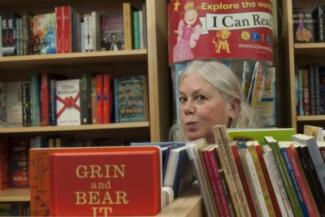
Heidi Greco lives in Surrey, where some would contend she can often still be found to be tilting at windmills. [Editor’s note: Heidi Greco has reviewed an exhibit by Douglas Coupland and books by Deirdre Simon Dore, M.A.C. Farrant, Michael Maitland, David Zieroth, Christine Lowther, Rhona McAdam, Richard Lemm, Souvankham Thammavongsa, Marguerite Pigeon, and John Gould for BCR. Three of her books have also been reviewed here: Glorious Birds: A Celebratory Homage to Harold and Maude, From the Heart of it All: Ten Years of Writing from Vancouver’s Downtown Eastside, and Practical Anxiety.]
*
The British Columbia Review
Interim Editors, 2023-25: Trevor Marc Hughes (nonfiction), Brett Josef Grubisic (fiction and poetry)
Publisher: Richard Mackie
Formerly The Ormsby Review, The British Columbia Review is an online book review and journal service for BC writers and readers. The Advisory Board now consists of Jean Barman, Wade Davis, Robin Fisher, Barry Gough, Hugh Johnston, Kathy Mezei, Patricia Roy, and Graeme Wynn. Provincial Government Patron (since September 2018): Creative BC. Honorary Patron: Yosef Wosk. Scholarly Patron: SFU Graduate Liberal Studies. The British Columbia Review was founded in 2016 by Richard Mackie and Alan Twigg.
“Only connect.” – E.M. Forster